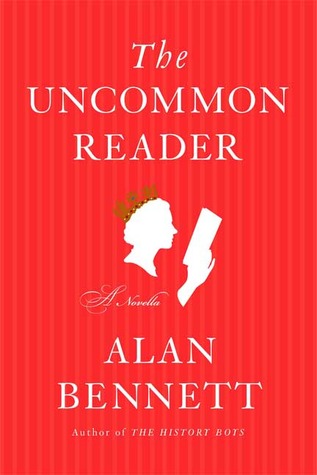Sunday, November 30, 2014
Saturday, November 29, 2014
Didn't put this down willingly
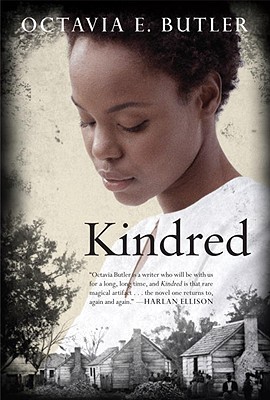
Kindred
by Octavia E. Butler
Time-travel story--modern-day woman goes back to experience slavery--without cliches. How'd she take such a subject and create a novel so convincing, so god-awful realistic, and so impossibly unpredictable?
I'm at a loss for words.
Remember this if you're trying to decide whether to read it--this isn't history. It's historically authentic (with an occasional slip-up in language), but it's not telling anybody's "universal" history. It's a woman heart in the breaking--not a man's great American novel. You'll experience the facts and feelings that made the institution of slavery corrosive and corrupting, bringing out the evil in the best of humanity, but you won't come out with any "lessons learned." It's not that trite.
Friday, November 28, 2014
Audibook hell

No Biking In the House Without a Helmet
by Melissa Fay Greene
Fascinating story of a family adopting five orphans from overseas...buried inside a dull-to-the-point-of-nausea story of an author's self doubts, family tales, and pets. I think it was the pets that finally did me in. Her self doubts prior to the first adoption and her depression that followed it seemed to be an important part of the story. She was trying to be honest with us, the readers, so it was interesting in spite of her bludgeonish writing style. Someone must have told her, why tell something once when you can say it over and over again, hardly varying the words, ad nauseum?
The family tales--mostly about her biological children--were kind of interesting, but not what we were there for. At times she was trying so hard to be funny that it grated. What kind of mother honestly doesn't recognize that there was a reason why a music store wouldn't sell her pre-teen daughter a CD unless the parent came in the store and paid for it? How out of touch could she be?
And--oh my god--the pets. I really, really NOT wanted to hear about her dogs. Not to mention squirrels, hamsters, guinea pigs, ducks...none of which seemed to be told in any relation to the adoptees and their reactions to the menagerie.
i I finished it. I'd highly recommend reading the book instead of listening to the audiobook, especially if you're the kind of person who can skim over her endless listings of items. At one point she goes to an Ethiopian market and proceeds to list every single item sold there. Honest to god. I must have taken up half of a page. It's never good enough to give three examples--she always gives thirty or fifty or who knows? I lost count after ten.
So...I take back my initial comment: "Fascinating story...." This could have been a fascinating story--with editing.
On a deeper note: is it right for a person, however deeply religious they may be, to adopt children from another religion and forcibly convert them? Maybe with a baby or maybe even a five-year-old, but a nine-year-old? Isn't that like saying, I applaud your heritage, but it's wrong?
Another deeper note: I have no right to criticize her family--only her book. But I had some real issues with her family, especially her hands-off husband, her own inability to learn from mistake, and their "rules" that never were enforced. I can only hope that some of the really bad parenting she describes is simple over-dramatization, put in to try and make the book funny. It wasn't.
Wednesday, November 26, 2014
Caitlan Moran rules. A bit.
 How to Be a Woman
How to Be a Womanby Caitlin Moran
Confession: I decided to read this book because the author was British. British people are funny, with their jumpers and knickers and best of all, their nudie pants. And I had no disappointment, there--even for a Brit, she raises the bar on funny ways of saying things.
It starts out biographical--first period, hairy pits, etc., but as she ages it become more topical. For example, Why you should have children followed by Why you shouldn't have children. And you learn that the the one question every female celebrity will always be asked is, "When are you going to have children?" Two points made there--not "are" but "when", and female celebrity. Imagine asking Albert Einstein that question.
She took advantage of the medium to make a few poignant points near the ending, off topic from feminism--
If we wonder why people are so apathetic and casual about every eminently avoidable horror in the world--famine, war, disease, the seas gradually turnng piss-yellow and filling with ring-pulls and shattered fax machines--it's right there. Heaven. The biggest waste of our time we ever invented, outside of jigsaws.
Yeah. Right there with ya.
Monday, November 24, 2014
Should've quit halfway, but just good enough to finish

Lost in Place: Growing up Absurd in Suburbia
by Mark Salzman
Mixed bag, here. Mark Salzman tells the story of his early teen to college age years. He was a most peculiar character. And his friends and teachers were so unique, so sublimely weird--his Kung Fu master, his best friend who used to beat him up, and especially his dad--they made a story themselves. His dad is a hoot.
Mixed bag, here. Mark Salzman tells the story of his early teen to college age years. He was a most peculiar character. And his friends and teachers were so unique, so sublimely weird--his Kung Fu master, his best friend who used to beat him up, and especially his dad--they made a story themselves. His dad is a hoot.
I get the impression that with the notable exception of a Chinese Studies professor, Mr. Salzman's relationships with women were uniquely flat. His mother was a concert celloist yet we know nothing about her. She's just there, like a plate on which you pile a slab of roast beef and onions. Who cares about the plate? It's just a flat thing to pile yourself onto.
I'm not being a sexist pig about this. His two girl friends are also, just "his girlfriends". He spends hours and hours hanging out with them and yet we don't know anything about them. I just didn't get it.
So...I guess you get the idea. If you're a guy who grew up in the era, you might enjoy it a lot.
Thursday, November 20, 2014
Ha ha--you got to read it to understand the title!

Eating Stone: Imagination and the Loss of the Wild
by Ellen Meloy
Poetry in prose so beautiful I can't write about it. I'm not good enough.
It's a loosely structured ode to the Bighorn Sheep of North America--both the Blue Door band that the author is watching and the other small enclaves widely scattered around, occupying a tiny portion of their original range. I can't imagine a world in which I'll never have the hope of hiking the canyon and coming unexpectedly on a band of bighorns...or canoeing a remote river and or catching sight of them edging down the cliffs...but it might happen. Contact with domestic sheep leaves them sick with diseases they have no resistance against. Only the determination of wildlife biologists--and the stubborn nature of bighorn--that gives them a fighting change.
I lost the many bookmarks of momentous passages, whimsical and weighty writing, all of which made her words sing like angels. Only a few of them remain, and not the best:
Chukars...[...] they have in tow six windup toys--tiny speedy chukar chicks, the avian version of loose electrons.
The gulls fuss and shriek over the entrails of the day's catch. Frigate brids move in and make the whole scene edgier. A gull nonchalantly swallows an entire fish head and bulges with meat. Too heavy to get off the ground, it sits on the sand like coyote fodder, shoulders hunched, belly distended, looking as if everything would be fine if it could just belch.
It's impossible to give a start marking to a book like this, so I'll default to 5. I'm missing the little bit of personal connection that I would usually require to mark a book 5 instead of 4, but that's me, all me.
Tuesday, November 18, 2014
Having fun working off the reading backlog
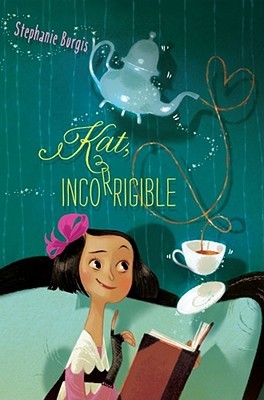
Kat Incorrigible
by Stephanie Burgis
Good plot twists. Decent action. Great story.
by Stephanie Burgis
Good plot twists. Decent action. Great story.
For the umpteenth time, if I were a pre-teen again, I'd have its sequels on my reading list and be planning my return trip to the library already. Angeline, Elissa, Katherine, and a brother who never appears onstage are the children of a (whisper) witch who died when Kat was born. When Angeline employs a love spell to bring her a husband who will pay off the brother's gambling debts and thus prevent her sister Elissa from making a martyr of herself by marrying an evil old dude, Kat has to rescue them both.
Very good present for a pre-teen reader in your family. But save yourself the trouble and buy the whole series.
Saturday, November 15, 2014
Quick and delightful
 Vegan, Virgin, Valentine
Vegan, Virgin, ValentineBy Caroline Mackler
A book to be neither savored nor sampled, but raced through from cover to cover. Hey, it takes all kinds of books to make a world.
Aside from the terse description, "teenage girls with problems," this is not at all like The Earth, My Butt, and Other Big Round Things. It takes all kinds of teenage girls with all kinds of problems to make a world, too.
Some, like Mara Valentine, are driven by a need to please a pair of overprotective but well-meaning parents. They won't admit it, but they're carrying a lot of guilt about "messing up" with their first daughter, Aimee, who dropped out of college and got pregnant at eighteen. The fruit of the pregnancy was Vivienne Vail Valentine, who wisely chooses to go by the nickname, "V".
When Mara's parents bring Mara's niece V to live with them and attend Mara's high school, it's probably the best thing that ever happened to V. Possibly the worst thing for Mara, though.
Thursday, November 13, 2014
A brief indulgence in birder's porn
 Raptors: North American Birds of Prey
Raptors: North American Birds of Preyby Noel and Helen Snyder
Lovely, detailed, and sprinkled with first-hand observations. My favorite was when they encountered a grizzly bear on their way back from observing Merlin in the mountains north of Fairbanks. Education and adventure--a marvel of pairings.
I didn't realize Owls weren't considered as raptors, at least not in this book. When I picked up this book at the library I saw a copy of Owls: Their Natural and Unnatural History. That's a book I remember well and fondly.
So back to my review of Raptors. Very good. Could have been better, but definitely worth the reading.
Monday, November 10, 2014
Swords and sorcery. Oh my!
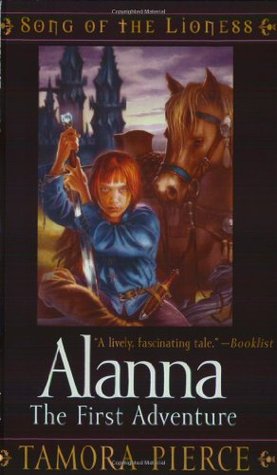
Alanna: The First Adventure
by Tamora Pierce
Pretty good YA adventure. Set in a make-believe world reminiscent of the middle age knights of chivalry, it's the story of a brother and sister who swap roles. He becomes a religious and studies to be a sorcerer; she becomes a knight. That is to say, eventually he becomes a sorcerer and she a knight--this book begins the story, but you sense many more to come.
I've said this about several YA novels but it's still just as true--and not at all demeaning--
If I'd read this as a kid, I'd be hooked for the duration. As a jaded, seen all, been all, done all grownup, I can live without the rest of the series. I'll put the second book on my to-read list as number #176 and see if it ever bubbles up to the top.
Sunday, November 9, 2014
Dog of the year. Any year.

A story of a dog but not just...it's equally as much the story of Farley Mowat--boy meets Mutt. Humor ensues.
I loved it--it made me laugh...and it had the power, at the end, to make me cry. Don't forgo the laughter and the adventure on account of the tears at the end. They're brief and not as bad as they could have been.
Mutt lives on! I wish I had Farley Mowat's skill at writing.
Wednesday, November 5, 2014
HIstory to the heart

A History of the World in 6 Glasses
by Tom StandageSix drinks that changed the world--beer, wine, spirits, coffee, tea, and Coca Cola. Who'd have thought it?
A lot of interesting history is crammed into this short book. It's easy to read and only very occasionally skipped over a valley that I wished it had slogged through. A couple of points to ponder:
- In the olden days, beer and wine were safer to drink than water. Coffee and tea, too, since they were made from boiled water. And I guess spirits mixed with water had a germ-killing effect.
- The history classes that they forced me to take in school completely downplayed the role of the East India Company in destroying Chinese civilization for years. All I learned about trade patters was molasses--rum--slaves. What about opium--gold--tea?
- Distilled wine was called aqua vitae and credited with magic powers. "It prolongs life, clears away ill humors, revives the heart, and maintains youth." We feel sorry for those poor people, so desparate to clutch at any remedy for the mysterious diseases that wasted away their loved ones' lives. We think we're so much better off than they--we think medicine has conquered disease and can cure all harm...but how much like them we are at the end. Still helpless before death; still looking for a miracle cure. And it isn't aqua vitae.
Tuesday, November 4, 2014
Why did I never read Virginia Woolf?
.
Should have been titled 500 pounds a year and a room of one's own, because that's what it's all about. It's a brilliant set of essays put together into a short book, and well worth the reading by anyone. Anytime. Anywhere.
Where are the great women writers, prior to the nineteenth century? What would have happened if Shakespeare had a sister? Why don't women take their places in the world of science and philosophy?
They've been too busy keeping the human race running. And great thought--or writing--doesn't grow from a crack on a sterile sidewalk--it needs the piled up compost of a ten century long cultivation. Exactly what women didn't have. They do now--and they better make use of it.
Monday, November 3, 2014
Wish I had a monster
 A Monster Calls
A Monster Callsby Patrick Ness
inspired by an idea from Siobhan Dowd
read by Jason Isaacs
I suffered through the absolutely brilliant rendition of this book on audio by Jason Isaacs, so even though I missed out on the illustrations I got the extra dimension of hearing a gloriously gruff monster growl. And by suffered, I do mean suffered. It's a painful book written about a painful experience and that exactly what it needs to be. When your mum's suffering from cancer and the treatments aren't helping, how do you cope?
Call up a monster.
(I'm suppressing my next statement violently with both hands. No leaks! No hints. No telling!)
Apparently they're going to make a movie out of this. It deserves one. I don't think I'll go see it, but I really hope they don't screw it up.
Sunday, November 2, 2014
Deep reading
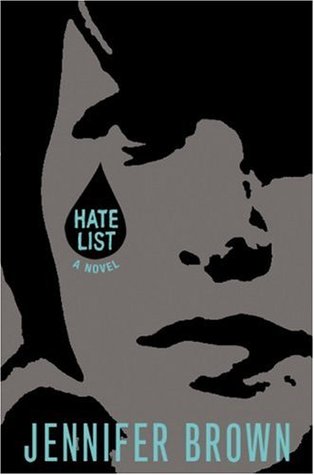 Hate List
Hate Listby Jennifer Brown
Why are the surnames Brown, White and Green common but not Yellow, Orange or Red? Who knows. And I'm off-topic. For a reason.
Reason being that once I read a few novels by an author whose surname was Brown. I don't remember her first name and don't see any reason to. They were dreck. Chaff. Fluff at best. Thrill rides on the imaginary rollercoaster of romantic love.
Those were books. This is a book. Both are cataloged under the general category of words on pages sandwiched between cardboard covers. But, in my very humble opinion, this, is a book.
From the cover blurb,
- Five months ago, Valerie Lefman's boyfriend, Nick, opened fire on their school cafeteria. Shot trying to stop him, Valerie inadvertantly save the life of a classmate, but was implicated in the shootings because of the list she helped create. A list of people and things she and Nick hated. The list he used to pick his targets.
The story unfolds in both present and past, with the facts of the shootings as chapter notes before Valerie's current day existence--if you can call it that. It's more like a quest for existence in a suffocating swamp of guilt and shame and confrontations with all the people who just can't understand. To people who lost their best friends, Nick was the embodiment of pure evil--how else could they deal with their pain? Evil had taken their friends--not random chance or mental illness or a small-town teenage culture of bullying. But to Valerie, Nick was not the ultimate evil. He was her boyfriend--kind, funny, gentle and loving. No more evil than you or me.
And her family is so damn real you just want to smack them! There are some things the author leaves unspoken and I hesitate to put my own feelings into the story, but I came away with a strong theory that most of her father's animosity is based on guilt of his own, guilt he will never admit. If he'd been there--if he'd been a real father--would she have made "better choices"? Would his own name have been left off the Hate List?
Better shut up. I'm telling too much. All I can say to recommend it is this: I read three-quarters of it in one sitting (300 pages); I bawled my eyes out when I re-read the ending; I wanted there to be more closure but won't complain. Real life doesn't have closure. It just continues.
Saturday, November 1, 2014
Graphic novels for grownups.

Alan's War
The Memories of G.I. Alan Cope
by Emmanuel Guibert
Emmanuel Guibert met Alan Cope in 1994 on an island off the coast of France. They struck up an immediate friendship--the 30-year-old graphic novelist and the 69-year-old ex-GI with a knack for telling stories of his life--and this book was conceived. To bring it to life must have taken the metaphorical nine months of a human pregnancy following by some number of hours of hard labor, but the results are substantial. Maybe men can birth babies after all.
If you're a history buff or a world war II fanatic, I recommend this. Maybe. Possibly as a antidote for the machine-gun fire and gut-wrenching reality of modern-day movies. (Anyone seen Captain America?) It's a reminder that every single man saw a different war. This one may seem a little tame by comparison but it's never boring...and it has pictures!
Subscribe to:
Comments (Atom)
